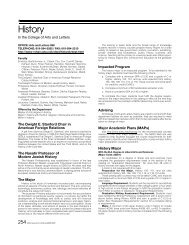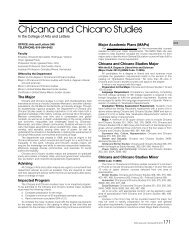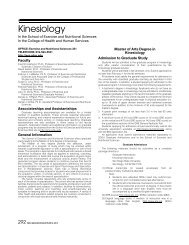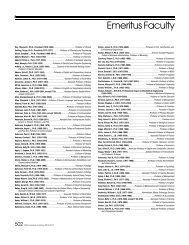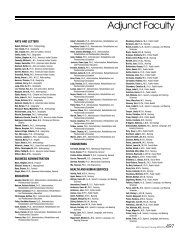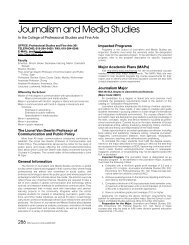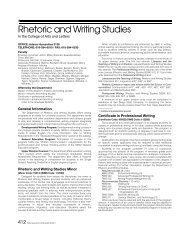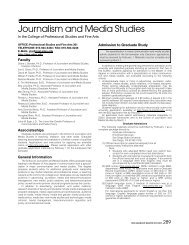Course Information - Enrollment Services Error Page - SDSU
Course Information - Enrollment Services Error Page - SDSU
Course Information - Enrollment Services Error Page - SDSU
Create successful ePaper yourself
Turn your PDF publications into a flip-book with our unique Google optimized e-Paper software.
<strong>Page</strong> revised 8-1-12 after publication.<br />
See RED text and change bar.<br />
Absence from Class<br />
Instructor Initiated Drop Policy<br />
Students who do not attend the first class session and the<br />
beginning of the second class session of a course may be dropped<br />
from that course by the instructor within the first eight class days of the<br />
semester. Students who do not meet prerequisite requirements can<br />
also be dropped within the first eight class days of the semester. Any<br />
student dropped by the instructor during this period will be notified of<br />
the action by e-mail. It is the student's responsibility to keep a current<br />
e-mail address on file through the <strong>SDSU</strong> WebPortal at http://<br />
www.sdsu.edu/portal. To reenroll, the student must receive an add<br />
code from the instructor and reenroll in the course by 6 p.m. on the<br />
12th class day of the semester.<br />
NOT ALL INSTRUCTORS WILL DROP STUDENTS WHO MISS THE<br />
FIRST CLASS SESSION AND THE BEGINNING OF THE SECOND<br />
CLASS SESSION; OR FOR LACK OF PREREQUISITES. Students are<br />
responsible for all courses on their schedules. Students should check<br />
their online schedules regularly and take necessary action to add or<br />
drop during the schedule adjustment period.<br />
Religious Observances<br />
By the end of the second week of classes, students should notify<br />
the instructors of affected courses of planned absences for religious<br />
observances. Instructors shall reasonably accommodate students<br />
who notify them in advance of planned absences for religious observances.<br />
Schedule Adjustment Policy<br />
The schedule adjustment period allows you to drop a course, add<br />
a course, withdraw from the university, and change the grading basis<br />
of a course. The deadline to DROP a class is at 11:59 p.m. on the 10th<br />
day of the term. The deadline to ADD a class, change grading basis or<br />
withdraw from the university is at 11:59 p.m. on the 12th day of the<br />
term. You are not allowed to make any schedule adjustments after<br />
these deadlines and are responsible for knowing the current semester<br />
dates for these deadlines, which can be found on the academic calendar<br />
and the Class Schedule registration notice.<br />
Major Academic Plans (MAPs)<br />
The MAPs Web site located at http://www.sdsu.edu/mymap was<br />
created to help first-time freshmen navigate the course requirements<br />
for their majors. The Major Academic Plans (MAPs) created for each<br />
major are not meant to encompass every major-specific requirement<br />
or a required sequencing of courses. Refer to this catalog for a complete<br />
description of requirements, including: course prerequisites,<br />
minimum grade requirements, unit limitations, and General Education<br />
approved courses and distribution requirements.<br />
The MAPs will help you identify which General Education course<br />
will also fulfill a major preparation course requirement. They will also<br />
suggest sequencing to ensure that you complete prerequisites for an<br />
upper-division course prior to taking the higher-level course.<br />
Questions about graduation requirements and General Education<br />
should be directed to the Academic Advising Center at 619-594-6668.<br />
The Academic Advising Center is located in Student <strong>Services</strong>, Room<br />
1551 (north of Aztec Center) and online at http://www.sdsu.edu/advising.<br />
<strong>Course</strong> <strong>Information</strong><br />
Numbering of <strong>Course</strong>s<br />
<strong>Course</strong>s numbered 80 through 99 are nonbaccalaureate level and<br />
are not acceptable for a bachelor’s degree; those numbered 100<br />
through 299 are in the lower division (freshman and sophomore<br />
years); those numbered 300 through 499 are in the upper division<br />
(junior and senior years) and intended for undergraduates; those<br />
numbered 500 through 599 are in the upper division and are also<br />
acceptable for advanced degrees when taken by students admitted<br />
to graduate standing; those numbered 600 through 799 are graduate<br />
courses; and those numbered 800 through 899 are doctoral courses.<br />
<strong>Course</strong>s numbered at the 900 level, except 997, are reserved for<br />
graduate courses in certain professional curricula as part of<br />
advanced certificate, credential, and licensure programs and are<br />
specifically intended for students admitted to the university with postbaccalaureate<br />
classified standing. Undergraduate students may<br />
enroll in these courses only if they are officially admitted to a blended<br />
or integrated program where undergraduate and credential coursework<br />
is included in the same program. <strong>Course</strong>s numbered at the 900<br />
level are not applicable to other graduate programs.<br />
<strong>Course</strong>s numbered 397 offered in regular sessions are professional<br />
advancement/training or tutorial/discussion classes that may<br />
accompany other credit courses and are not acceptable towards an<br />
undergraduate or graduate degree.<br />
<strong>Course</strong>s numbered X-01 through X-79 and X-397 are Extension<br />
professional development units offered only through Extension to<br />
meet specific academic needs of community groups and are not<br />
acceptable toward an undergraduate or graduate degree.<br />
The Unit or Credit Hour<br />
As of July 1, 2011 federal law (600.2 and 600.4) requires all<br />
accredited institutions to comply with the federal definition of the<br />
credit hour. For all CSU degree programs and courses bearing academic<br />
credit, the “credit hour” is defined as “the amount of work represented<br />
in intended learning outcomes and verified by evidence of<br />
student achievement that is an institutionally established equivalency<br />
that reasonably approximates not less than:<br />
1. One hour of classroom or direct faculty instruction and a minimum<br />
of two hours of out-of-class student work each week for<br />
approximately fifteen weeks for one semester or trimester hour<br />
of credit, or ten to twelve weeks for one quarter hour of credit,<br />
or the equivalent amount of work over a different amount of<br />
time; or<br />
2. At least an equivalent amount of work as required in paragraph<br />
(1) of this definition for other academic activities as established<br />
by the institution, including laboratory work, internships, practica,<br />
studio work, and other academic work leading to the<br />
award of credit hours.”<br />
A credit hour is assumed to be a 50-minute period. In courses, in<br />
which “seat time” does not apply, a credit hour may be measured by an<br />
equivalent amount of work, as demonstrated by student achievement.<br />
<strong>SDSU</strong> General Catalog 2012-2013 111
<strong>Page</strong> revised 8-1-12 after publication.<br />
See RED text and change bar.<br />
<strong>Course</strong> <strong>Information</strong><br />
Prerequisites for Undergraduate <strong>Course</strong>s<br />
Students must satisfy course prerequisites (or their equivalent)<br />
prior to beginning the course to which they are prerequisite. Faculty<br />
have the authority to enforce prerequisites listed in the current catalog<br />
and current Class Schedule, to evaluate equivalent preparation, and<br />
to require proof that such prerequisites/preparation have been completed.<br />
Students who do not meet prerequisite requirements can be<br />
dropped within the first eight days of the semester.<br />
NOT ALL INSTRUCTORS WILL DROP STUDENTS WHO MISS THE<br />
FIRST CLASS SESSION AND THE BEGINNING OF THE SECOND<br />
CLASS SESSION; OR FOR LACK OF PREREQUISITES. Students are<br />
responsible for all courses on their schedules. Students should check<br />
their online schedules regularly and take necessary action to add or<br />
drop during the schedule adjustment period.<br />
General Education and<br />
American Institution <strong>Course</strong>s<br />
Notations in brackets at the end of course titles in the course<br />
listings identify courses which satisfy General Education [GE] and<br />
American Institutions [AI] requirements. See Graduation<br />
Requirements for the Bachelor's Degree section in this catalog for full<br />
explanation.<br />
Common <strong>Course</strong>s<br />
Experimental or Selected Studies or Topics or Workshop<br />
<strong>Course</strong>s (96, 296, 496, 596)<br />
<strong>Course</strong>s offered by departments under the numbers 296, 496, 596<br />
are subject to the following conditions: no more than nine units of such<br />
courses shall be applicable toward a bachelor’s degree; such<br />
courses may be applicable toward the minor or toward preparation for<br />
the major only with the approval of the department chair.<br />
Topics courses may be offered by the departments under the number<br />
96. These courses are nonbaccalaureate level and are not<br />
acceptable for a bachelor’s degree or General Education.<br />
112 <strong>SDSU</strong> General Catalog 2012-2013<br />
Special Study (299, 499, 599)<br />
These courses provide opportunity for individual study of a subject<br />
not offered in the regular curriculum. The student does this outside of<br />
the classroom and must secure the consent of an instructor to<br />
supervise the study before registering for the course. The student<br />
should discuss the topic with the instructor and come to an<br />
understanding on the amount of time to be devoted to the topic, the<br />
credit to be earned, and the mode of investigation and report to be<br />
used. As with regular courses, the expectation is that the student will<br />
devote three hours per week to the subject for each unit of credit. A<br />
maximum combined credit of nine units of 299, 499, and 599 is<br />
applicable to a bachelor’s degree. Examination credit awarded for a<br />
299 course is excluded from the nine unit limit. Maximum credit of six<br />
units of 499 in one department applicable to a bachelor’s degree.<br />
A 499 or 599 number cannot be used to offer lower division<br />
coursework. Also, 299, 499, and 599 cannot be used to extend internships,<br />
to award academic credit in place of pay, for work experience,<br />
or for class-sized groups.<br />
Credit/No Credit <strong>Course</strong>s<br />
<strong>Course</strong>s which are offered for credit/no credit are indicated by the<br />
symbols Cr/NC in the course title.<br />
Online and Hybrid <strong>Course</strong>s<br />
Certain courses may be offered as online (distance education) or<br />
hybrid (combination online and in-person). The online and hybrid<br />
courses offered each term can be found in the Class Schedule.<br />
Faculty Office Hours<br />
All faculty members are required to hold regularly scheduled office<br />
hours during the week to allow for student consultation. A schedule of<br />
those hours is posted outside each faculty member’s office door.
Accreditation<br />
San Diego State University is accredited by the Accrediting<br />
Commission for Senior Colleges and Universities of the Western<br />
Association of Schools and Colleges, 985 Atlantic Avenue, Suite 100,<br />
Alameda CA 94501, 510-748-9001; FAX 510-748-9797; e-mail:<br />
wascsr@wascsenior.org; http://www.wascweb.org. It is also approved<br />
to train veterans under the G.I. Bill.<br />
San Diego State University’s programmatic accreditation is<br />
through membership in the following associations:<br />
Accreditation Council for Graduate Medical Education<br />
(Preventive Medicine Residency Program)<br />
515 N. State Street, Suite 2000<br />
Chicago, IL 60654<br />
312-755-7498<br />
American Association of Colleges for Teacher Education<br />
1307 New York Ave, NW<br />
Washington, D.C. 20005<br />
202-293-2450, http://www.aacte.org<br />
American Chemical Society<br />
Committee on Professional Training<br />
1155 Sixteenth Street, N.W.<br />
Washington, D.C. 20036<br />
202-872-4600, http://www.acs.org<br />
American College of Nurse Midwives Accreditation<br />
Commission for Midwifery Education<br />
8403 Colesville Road, Suite 1550<br />
Silver Spring, MD 20910-6374<br />
240-485-1802, http://www.midwife.org<br />
American Psychological Association (Clinical Psychology)<br />
750 First Street, N.E.<br />
Washington, D.C. 20002-4242<br />
202-336-5500, http://www.apa.org<br />
Council on Academic Accreditation in Audiology<br />
and Speech-Language Pathology<br />
2200 Research Boulevard<br />
Rockville, MD 20850-3289<br />
301-296-5700, http://www.asha.org<br />
California Commission on Teacher Credentialing<br />
1900 Capitol Avenue<br />
Sacramento, CA 95811<br />
888-921-2682, http://www.ctc.ca.gov<br />
Commission on Accreditation of Healthcare<br />
Management Education<br />
2000 14th Street North, Suite 780<br />
Arlington, VA 22201<br />
703-894-0960, http://www.cahme.org<br />
Commission on Collegiate Nursing Education<br />
One Dupont Circle, NW, Suite 530<br />
Washington, D.C. 20036-1120<br />
202-887-6791, http://www.aacn.nche.edu<br />
Council for Interior Design Accreditation<br />
146 Monroe Center NW, #1318<br />
Grand Rapids, MI 49503-2822<br />
616-458-0400, http://www.accredit-id.org/<br />
Council of Graduate Schools<br />
One Dupont Circle, N.W., Suite 430<br />
Washington, D.C. 20036-1173<br />
202-223-3791, http://www.cgsnet.org<br />
Council on Education for Public Health<br />
1015 Fifteenth Street, N.W.<br />
Washington, D.C. 20005<br />
202-789-1050, http://www.ceph.org<br />
Council on Social Work Education<br />
1725 Duke Street, Suite 500<br />
Alexandria, VA 22314-3457<br />
703-683-8080, http://www.cswe.org<br />
National Association of School Psychologists<br />
4340 East West Highway, Suite 402<br />
Bethesda, MD 20814<br />
301-657-0280, http://www.ceph.org<br />
National Association of Schools of Art and Design<br />
11250 Roger Bacon Drive, Suite 21<br />
Reston, VA 20190<br />
703-437-0700, http://www.ceph.org<br />
<strong>Course</strong> <strong>Information</strong><br />
National Association of Schools of Public Affairs<br />
and Administration<br />
1120 G Street, N.W., Suite 730<br />
Washington, D.C. 20005-3801<br />
202-628-8965, http://www.ceph.org<br />
National Association of Schools of Theatre<br />
11250 Roger Bacon Drive, Suite 21<br />
Reston, VA 20190-5248<br />
703-437-0700, http://www.ceph.org<br />
National Council on Rehabilitation Education<br />
c/o Charles Arokiasamy, Chief Operating Officer<br />
California State University, Fresno<br />
5005 N. Maple Ave, M/S ED 3<br />
Fresno, CA 93740<br />
559-906-0787, http://www.rehabeducators.org<br />
National Recreation and Park Association<br />
22377 Belmont Ridge Road<br />
Ashburn, VA 20148<br />
703-858-0784, http://www.nrpa.org<br />
Western Association of Graduate Schools<br />
University of Washington, The Graduate School<br />
Box 351240<br />
Seattle, WA 98195-1240<br />
206-543-9054, http://www.wagsonline.org<br />
In addition, San Diego State University is accredited by the following<br />
agencies:<br />
The College of Business Administration and the School of<br />
Accountancy are accredited by AACSB International—The<br />
Association to Advance Collegiate Schools of Business—at both<br />
the undergraduate and graduate levels. Several College of<br />
Business Administration programs are registered with the<br />
Certified Financial Planner Board of Standards, 1425 K Street,<br />
NW, Suite 500, Washington, D.C. 20005, 202-379-2200.<br />
The College of Engineering undergraduate programs in<br />
aerospace engineering, civil engineering, computer<br />
engineering, construction engineering, electrical engineering,<br />
environmental engineering and mechanical engineering are<br />
accredited by the Engineering Accreditation Commission (EAC)<br />
of ABET, 111 Market Place, Suite 1050, Baltimore, MD 21202-<br />
4012, 410-347-7700.<br />
The School of Journalism and Media Studies programs in<br />
advertising, journalism, and public relations are accredited by<br />
the Accrediting Council on Education in Journalism and Mass<br />
Communication, Stauffer-Flint Hall, 1435 Jayhawk Boulevard,<br />
Lawrence, KS 66045-7575, 785-864-3973,<br />
http://www2.ku.edu/~acejmc/index.html.<br />
The School of Nursing is accredited by the California Board of<br />
Registered Nursing, State of California, Department of Consumer<br />
Affairs, 400 R Street., Suite 4030, Sacramento, CA 95814, 916-<br />
322-3350.<br />
Concentrations in Environmental Health and Occupational<br />
Health, in the Graduate School of Public Health are accredited by<br />
the American Board for Engineering and Technology, 111 Market<br />
Place, Suite 1050, Baltimore, MD 21202, 410-347-7700.<br />
The undergraduate program in Athletic Training in the School<br />
of Exercise and Nutritional Sciences is accredited by the<br />
Commission on Accreditation of Athletic Training Education,<br />
2201 Double Creek Drive, Suite 5006, Round Rock, TX 78664,<br />
512-733-9700, http://www.caate.net.<br />
Foods and Nutrition, the Didactic Program in Dietetics in the<br />
School of Exercise and Nutritional Sciences is approved by the<br />
Commission on Accreditation of Dietetics Education, American<br />
Dietetic Association, 120 South Riverside Plaza, Suite 2000,<br />
Chicago, IL 60606-6995, 800-877-1600,<br />
http://www.eatright.org/default.aspx.<br />
<strong>SDSU</strong> General Catalog 2012-2013 113
<strong>Course</strong> <strong>Information</strong><br />
<strong>Course</strong> Abbreviations<br />
ACCTG ............. Accountancy<br />
ARP................... Administration, Rehabilitation and<br />
Post Secondary Education<br />
A E .................... Aerospace Engineering<br />
A S .................... Aerospace Studies<br />
AFRAS .............. Africana Studies<br />
AMIND .............. American Indian Studies<br />
ANTH ................ Anthropology<br />
ARAB ................ Arabic<br />
ART ................... Art<br />
ASIAN ............... Asian Studies<br />
ASTR................. Astronomy<br />
AUD .................. Audiology<br />
BIOMI................ Bioinformatics and Medical Informatics<br />
BIOL.................. Biology<br />
BQS .................. Biomedical Quality Systems<br />
B A .................... Business Administration<br />
CAL................... Arts and Letters<br />
CHEM ............... Chemistry<br />
CCS .................. Chicana and Chicano Studies<br />
CFD................... Child and Family Development<br />
CHIN ................. Chinese<br />
C P .................... City Planning<br />
CIV E................. Civil Engineering<br />
CLASS .............. Classics<br />
COMM .............. Communication<br />
CINTS ............... Comparative International Studies<br />
C LT................... Comparative Literature<br />
COMP ............... Computational Science<br />
COMPE ............. Computer Engineering<br />
CS ..................... Computer Science<br />
CON E............... Construction Engineering<br />
CSP................... Counseling and School Psychology<br />
CJ ..................... Criminal Justice<br />
DANCE ............. Dance<br />
DPT ................... Doctor of Physical Therapy<br />
ECON................ Economics<br />
ED ..................... Education<br />
EDL ................... Educational Leadership<br />
EDTEC .............. Educational Technology<br />
E E..................... Electrical Engineering<br />
ENGR................ Engineering<br />
E M.................... Engineering Mechanics<br />
ENGL ................ English<br />
ENV E................ Environmental Engineering<br />
ENV S................ Environmental Science<br />
EUROP.............. European Studies<br />
ENS................... Exercise and Nutritional Sciences<br />
FILIP.................. Filipino<br />
FIN .................... Finance<br />
FRENC .............. French<br />
GMS.................. General Mathematics Studies<br />
GEN S ............... General Studies<br />
GEOG ............... Geography<br />
GEOL ................ Geological Sciences<br />
GERMN............. German<br />
GERO................ Gerontology<br />
HHS .................. Health and Human <strong>Services</strong><br />
HEBRW ............. Hebrew<br />
HIST .................. History<br />
H SEC ............... Homeland Security<br />
114 <strong>SDSU</strong> General Catalog 2012-2013<br />
HONOR .............Honors Program<br />
HTM...................Hospitality and Tourism Management<br />
HUM ..................Humanities<br />
INT S..................Interdisciplinary Studies<br />
I B ......................International Business<br />
ISCOR ...............International Security and Conflict Resolution<br />
ITAL ...................Italian<br />
JAPAN ...............Japanese<br />
JS ......................Jewish Studies<br />
JMS ...................Journalism and Media Studies<br />
KOR...................Korean<br />
LATAM ...............Latin American Studies<br />
LGBT .................Lesbian, Gay, Bisexual, and Transgender Studies<br />
LIB S..................Liberal Studies<br />
LING ..................Linguistics<br />
MGT...................Management<br />
MIS ....................Management <strong>Information</strong> Systems<br />
MKTG ................Marketing<br />
MALAS ..............Master of Liberal Arts and Sciences<br />
MATH.................Mathematics<br />
M S E .................Mathematics and Science Education<br />
MTHED ..............Mathematics Education<br />
M E ....................Mechanical Engineering<br />
MIL S .................Military Science<br />
M BIO ................Molecular Biology<br />
MUSIC ...............Music<br />
N SCI .................Natural Science<br />
NAV S ................Naval Science<br />
NURS.................Nursing<br />
NUTR.................Nutrition<br />
OCEAN..............Oceanography<br />
PERS .................Persian<br />
PHIL...................Philosophy<br />
PHYS .................Physics<br />
PLC....................Policy Studies in Language and Cross-Cultural<br />
Education<br />
POL S ................Political Science<br />
PORT .................Portuguese<br />
PSFA..................Professional Studies and Fine Arts<br />
PSY....................Psychology<br />
P A.....................Public Administration<br />
P H.....................Public Health<br />
RTM ...................Recreation and Tourism Management<br />
R A.....................Regulatory Affairs<br />
REL S.................Religious Studies<br />
RWS...................Rhetoric and Writing Studies<br />
RUSSN ..............Russian<br />
SCI.....................Science<br />
SWORK .............Social Work<br />
SOC...................Sociology<br />
SPAN .................Spanish<br />
SPED .................Special Education<br />
SLHS .................Speech, Language, and Hearing<br />
Sciences<br />
STAT ..................Statistics<br />
SUSTN...............Sustainability<br />
TE ......................Teacher Education<br />
TFM ...................Television, Film and New Media<br />
THEA .................Theatre<br />
VIET ...................Vietnamese<br />
WMNST .............Women's Studies



